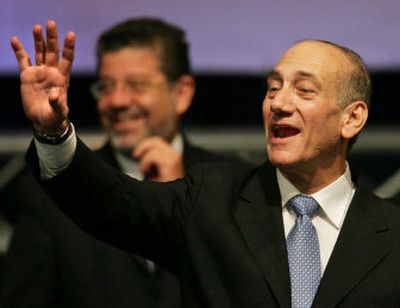Israel’s Olmert hurries to form coalition

JERUSALEM – Urged by Israel’s president to move swiftly, acting Prime Minister Ehud Olmert began working Wednesday to assemble a governing coalition in the wake of his centrist party’s narrower-than-expected election victory.
The immediacy of the task was underscored in Gaza City by the swearing-in of the new Palestinian government dominated by the Islamist group Hamas – a regional milestone that will greatly complicate any moves on the peace front.
Since its own election victory two months ago, Hamas has resisted calls to renounce its aim of Israel’s destruction. Now that its new government is officially in place, that stance is likely to bring about a near-cessation of official Palestinian contacts with the new Israeli government, and to imperil international aid to the Palestinian Authority.
Wednesday, in the latest international move to isolate Hamas, Canada announced it was suspending assistance to the Palestinian Authority.
With a glum-looking Palestinian Authority President Mahmoud Abbas looking on, members of the new Palestinian Cabinet each laid a hand on the Quran and took the oath of office.
Israel’s president, Moshe Katsav, said an array of potential threats had spurred him to put aside the waiting period for a formal announcement of election results, expected to be made next week. He called on the various political factions to start aligning themselves without delay.
“The new government does not have much time – there are weighty issues on the agenda,” Katsav said. “All the parties … should pull together and start cooperating so that the government can form and run the country.” Informal talks between the various political camps were already under way, Israeli media reported.
Tuesday’s election results gave a clear victory to Israeli parties that are committed to ceding more territory to the Palestinians in the wake of last summer’s Israeli pullout from the Gaza Strip.
Both Olmert’s party, Kadima, and the second-place Labor Party say that Israel will have to give up many of its West Bank settlements, though the two differ on whether the Jewish state should proceed unilaterally or on the basis of negotiations.
With Hamas now in power, however, any peace talks are highly unlikely. Still, Olmert signaled in his victory speech that he hoped to maintain contacts with the Palestinian Authority’s pragmatist-minded president, Mahmoud Abbas.
Israeli analysts and Olmert’s allies said that although Kadima’s mandate was smaller than he had hoped for – 28 seats in the 120-member Knesset – parties likely to ally with him would be able to fend off efforts by the right wing to block West Bank withdrawals.
“I believe we will have more than 70 legislators who will support the disengagement plan,” senior Kadima lawmaker Haim Ramon told Israel Radio.
But the results will leave Olmert and Kadima vulnerable to the often-bruising vicissitudes of Israeli coalition politics.
“A leading party with less than 30 seats is much more dependent on partner parties,” said analyst Yoram Peri, of Tel Aviv University.